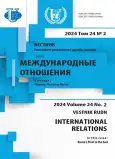Transboundary Interactions Between Afghanistan and the Shanghai Cooperation Organization After the US Withdrawal from Afghanistan
- Authors: Rauf S.1
-
Affiliations:
- National University of Modern Languages
- Issue: Vol 24, No 2 (2024): Russia’s Pivot to the East
- Pages: 252-263
- Section: INTERNATIONAL SECURITY
- URL: https://journal-vniispk.ru/2313-0660/article/view/320707
- DOI: https://doi.org/10.22363/2313-0660-2024-24-2-252-263
- EDN: https://elibrary.ru/WMSEPQ
- ID: 320707
Cite item
Abstract
This paper aims to examine the functional utility of the Shanghai Cooperation Organization (SCO) for regional stability after the withdrawal of the United States from Afghanistan. The instability in Afghanistan may become a serious regional challenge for the SCO to seek an acceptable solution. The study addresses the question that how the SCO members are dealing with the emerging crisis in Afghanistan. Hence, the prospective role of the SCO in building consensus among member states is unravelled with a conceptual framework, based on two theories of international relations namely regional security complex and functional cooperation theory. These theories provide a conceptual understanding that the interests of states, belonging to a general geographical region, are integrated and their mutual cooperation is more durable than the states outside the region. Subsequently, the study explored the role of the SCO in maintaining regional security and traced its efforts for stability. To explore the complexities within the SCO while managing the nascent government of the Taliban (forbidden in Russia) in Afghanistan, qualitative data has been collected. The data includes government websites, official statements and documents, books, research articles and newspapers, published in different countries. It is found that the worsening security situation in Afghanistan is a common threat to all the members of the SCO, so consensus is required to promote practical measures including the development of Afghanistan. Therefore, the SCO is focusing on addressing the immediate and tangible consequences of the Taliban’s takeover after the withdrawal of the US forces from Afghanistan and supporting regional states to adopt functional cooperation to reconstruct Afghanistan.
About the authors
Sarwat Rauf
National University of Modern Languages
Author for correspondence.
Email: sarwatrana@gmail.com
ORCID iD: 0000-0003-2239-6934
PhD, Associate Professor, Department of International Relations
Islamabad, PakistanReferences
- Ahmad, I. (2018). Shanghai Cooperation Organization: China, Russia and regionalism in Central Asia. In H. Loewen & A. Zorob (Eds.), Initiatives of regional integration in Asia in comparative perspective: Concepts, contents and prospects (pp. 119-135). Dordrecht: Springer. https://doi.org/10.1007/978-94-024-1211-6_6
- Akhtar, M. N., & Javaid, F. (2024). The role of Shanghai Cooperation Organization in the Afghan crisis. In P. Pietrzak (Ed.), Dealing with regional conflicts of global importance (pp. 44-62). Hershey: IGI Global. https://doi.org/10.4018/978-1-6684-9467-7.ch003
- Amable, D. S. (2022). Theorizing the emergence of security regions: An adaptation for the regional security complex theory. Global Studies Quarterly, 2(4), 1-10. https://doi.org/10.1093/isagsq/ksac065
- Buzan, B., & Wæver, O. (2003). Regions and powers: The structure of international security. New York: Cambridge University Press.
- Cheng, J. Y. S. (2015). The Afghanistan situation and China’s new approach to the SCO. Asian Survey, 55(2), 346-370. https://doi.org/10.1525/as.2015.55.2.346
- Chung, Chien Peng. (2006). China and the institutionalization of the Shanghai Cooperation Organization. Problems of Post-Communism, 53(5), 3-14. https://doi.org/10.2753/PPC1075-8216530501
- Godehardt, N. (2014). The Chinese constitution of Central Asia: Regions and intertwined actors in international relations. Basingstoke: Palgrave Macmillan. https://doi.org/10.1057/9781137359742
- Iqbal, S., & Rauf, S. (2018). Afghanistan imbroglio: Impact on the Central Asian states. Central Asia Journal, 83, 55-77. https://doi.org/10.54418/ca-83.29
- Krasnopolsky, P. (2022). China, Russia and Central Asian infrastructure: Fragmenting or reformatting the region? Singapore: Palgrave Macmillan. https://doi.org/10.1007/978-981-19-4254-9
- Mitrany, D. (1948). The functional approach to world organization. International Affairs, 24(3), 350-363. https://doi.org/10.2307/3018652
- Niblock, T. (2018). The Shanghai Cooperation Organisation: Structure and dynamics, and the role of Gulf states. Asian Journal of Middle Eastern and Islamic Studies, 12(4), 401-420. https://doi.org/10.1080/25765949.2018.1564857
- Nourzhanov, K., & Saikal, A. (2021). The spectre of Afghanistan: Security in Central Asia. London: I.B. Tauris.
- Olcott, M. B. (2008). Central Asia: Carving an independent identity among peripheral powers. In D. L. Shambaugh & M. B. Yahuda (Eds.), International relations of Asia (pp. 234-257). Lanham: Rowman & Littlefield Publishers.
- Omelicheva, M. Y. (2010). Counterterrorism policies in Central Asia. London: Routledge.
- Opacin, N. (2014). China’s role in Afghanistan: A capitalist peace approach. Hamburg: Anchor Academic Publishing.
- Patnaik, A. (2016). Central Asia: Geopolitics, security and stability. New Delhi: Routledge.
- Qingguo, J. (2007). The Shanghai Cooperation Organization: China’s experiment in multilateral leadership. In A. Iwashita (Ed.), Eager eyes fixed on Eurasia: Russia and its Eastern edge (pp. 113-123). Sapporo: Slavie Research Center, Hokkaido University.
- Rahimov, Kh. (2013). The Shanghai Cooperation Organization and the fight against terrorism in and around Central Asia. In O. F. Tanrisever (Ed.), Afghanistan and Central Asia: NATO’s role in regional security since 9/11 (pp. 215-229). Amsterdam: IOSnPress. https://doi.org/10.3233/978-1-61499-179-3-215
- Roy, M. S. (2010). Role of the Shanghai Cooperation Organization in Afghanistan: Scope and limitations. Strategic Analysis, 34(4), 545-561. https://doi.org/10.1080/09700161.2010.483149
- Rytövuori-Apunen, H. (Ed.). (2016). The regional security puzzle around Afghanistan: Bordering practices in Central Asia and beyond. Opladen: Barbara Budrich Publishers. https://doi.org/10.3224/84740789
- Sheraliyev, O. R. (2014) Shanghai Cooperation Organization and the anti-narcotic campaign: Quest for a common combat platform. In P. L. Dash, A. Sengupta & M. M. Bakhadirov (Eds.), Central Asia and regional security (pp. 295-327). New Delhi: KW Publishers.
- Starr, S. F., & Cornell, S. E. (2018). Uzbekistan’s new face. Lanham: Rowman & Littlefield Publishers.
- Telò, M. (2023). Multilateralism past, present and future: A European perspective. London: Routledge. https://doi.org/10.4324/9781003280101
- Vasilyeva, N. A., & Lagutina, M. L. (2016). The Russian project of Eurasian integration: Geopolitical prospects. Lanham: Lexington Books.
Supplementary files









